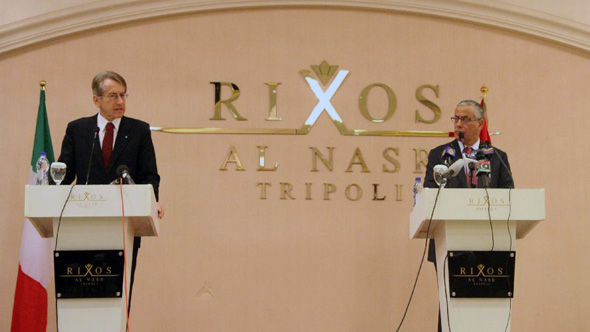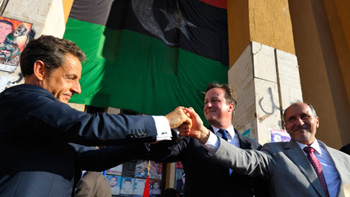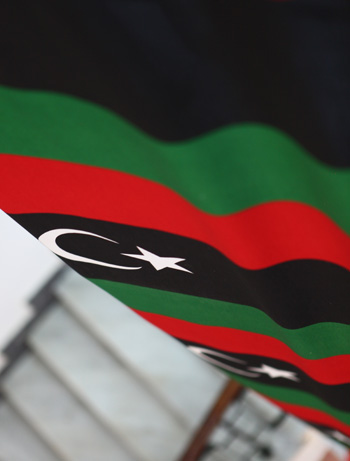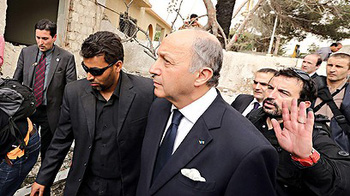Libyan Foreign Relations: Making Friends amid growing Pains
Libya Top Stories
Libyan Foreign Relations: Making Friends amid growing Pains
With the establishment of first the National Transitional Council; the election of its successor, the General National Council and a prime minster, the majority of countries quickly lined up to recognize the new state.

Libyan Foreign Relations: Making Friends amid growing Pains
By TK Maloy
TRIPOLI – With the establishment of first the National Transitional Council; the election of its successor, the General National Council and a prime minster, the majority of countries quickly lined up to recognize the new state.
In fact, even while fighting was still active over 100 countries; the United Nations, and a number of other international organizations formally recognized the NTC as Libya’s legitimate authority. The lineup of countries and international organizations supporting the NTC came even quicker once the civil war came to an end.
The Arab League reinstated Libya to formal membership on August 27, 2011; again recognizing the NTC as de-facto government of the new nation.

On Libya’s part – it held out a new, less quixotic (as under the dictator), and more democratic hand of friendship to the world.
While in diplomacy the word “reset” has worked its way into the argot, this was one of the most tangible examples of a single nation’s reset with its multilateral foreign relations and policy in recent diplomatic history.
Starting from almost a zero point, the government has been opening the country to foreign business; renegotiating contracts made during the regime, and also trying to boost a tourism sector which if not for the security worries of foreigners could potentially be a large income generator for the country.
Libya has had recent talks with Italy and Malta seeking assistance in promoting the tourism sector and a number of key air carriers have reestablished flights to the country, both for business travelers and tourism.
Among the various efforts to court the international business community was this year’s oil and gas conference with plans for a larger event next year.
The 2014 Oil and Gas Libya exhibition has been set for May with the Ministry of Oil and Gas and the National Oil Corporation playing host. The recent conference drew 3,000 oil industry professionals to Libya.
Misrata is home to the largest number of militia forces in Libya, with 230 separate militias running a rotating system for policing duties. All entrances to the city have “gates”, checkpoints where each vehicle is inspected.
Consequently, Misrata, is also considered one of the safest cities in Libya.
Among the principal participants this May were the French led by Total, the Turks headed by the Turkish Petroleum Corporation and the Chinese, fronted by China Petroleum Technology and Development Corporation.
Upcoming is the FDI Libya Conference which will be held in London during mid-September and is part of a larger ongoing Foreign Direct Investment Libya initiative which will also hold events to bring together the international community in Dubai and Tripoli.
In early August, American officials and business persons met with their Libyan counterparts in Washington for a round-table on Libya’s economic program.
Key officials attending included Omar Shakmak, Deputy Minister of Oil & Gas, Mustafa Sanalla, board member Libyan National Oil Company, Karim Mezran, Senior Fellow, Rafik Hariri Center for the Middle East, Atlantic Council, Chuck Dittrich – Executive Director, U.S.-Libya Business Association, Hoda Atia Moustafa, Senior Counsel, Legal and Claims Group, MIGA, World Bank Group and Director of Projects Tariq Mohammed from the Pace Group consulting firm.
“The opportunity for Investment in Libya ranges to all major sectors throughout Libyan society whether it be private or public.” Shakmak said. “This means that Libyans and the international community (will) have to work hand in hand to see a prosperous Libya.”
“Companies who do decide to invest in Libya will find people who are ready to develop their country, excited to see foreign investment and modernization and a commitment to realize a long awaited New Libya.”
Despite these bilateral and multilateral meetings this is not to say Libya’s transition to democracy, reconstruction and its foreign relations have not been without complications.
Relations were strained with the United States after the large-scale attack by militants on the US consulate in Benghazi and the assassination of American ambassador J. Christopher Stevens.
Also, after the recent assassination of political activist Abdulsalam Musmair in July the European Union condemned the killing and the recent bomb attacks in Benghazi.
According to the Libyan Herald, The High Representative of the European Union for Foreign Affairs and Security Policy and Vice President of the European Commission, Catherine Ashton said the EU trusted that the Libyan authorities would ensure that the perpetrators of recent acts of violence would be brought to justice. She also called upon all Libyans to support the efforts that the democratically-elected government was making.
“The EU remains a firm friend to Libya and steadfast in its readiness to stand by the Libyan people in meeting the challenges ahead,” she said.
After the surrounding of both the Foreign Ministry and the Justice Ministry in late April by militias who had fought in the rebellion, the government was forced to pass a “Political Isolation Law” banning former Qaddafi-era officials from serving in government.
A number of foreign advisers warned Libya’s government against this as it would repeat the mistake made by the US during its control of Iraq when the Coalition Authority banned all Bathist party members from government service, thus losing an entire administrative group that had any experience in running the functioned apparatus of government.
Because of the militia pressure, the government of Prime Minister Ali Zeidan had little choice but to bend on the issue. The isolation law was passed on May 5. There was public protests after-the-fact over the role the militias played in forming public policy. Meanwhile opponents of Zeidan were thwarted in efforts to oust the PM who still has sufficient centrist-political sand to beat back such attempts.
 One observer (a member of the Carnegie Endowment for Peace and a regional expert) did note however: “In nearly every crisis in Libya since 2011, civil society has helped pull the country back from the brink. Last Friday, thousands of Libyans marched toward the besieged Foreign Ministry to confront the armed militias,” wrote Frederic Wehrey in a May 16 Washington Post op-ed.
One observer (a member of the Carnegie Endowment for Peace and a regional expert) did note however: “In nearly every crisis in Libya since 2011, civil society has helped pull the country back from the brink. Last Friday, thousands of Libyans marched toward the besieged Foreign Ministry to confront the armed militias,” wrote Frederic Wehrey in a May 16 Washington Post op-ed.
“Those I spoke with said they were marching for the principles of due process and democracy. True, many disagreed with the government, its corruption and its inefficiency. But their signs and banners bore witness to the idea that changes in government should come through legal, peaceful means, not by armed intimidation.”
In late June, a delegation from the Arab League met with Libyan Foreign Minister Mohamed Abdulazi for talks on the general security situation of the nation. The minister noted in talks with the League that Libya was still very much in a transitional state from the revolution which overthrew Gaddafi to an actual state with rule of law and de-facto government institutions.
Headed by Deputy Secretary-General Ahmed Ben Halli, the Arab League group also offered help with the formation of the 60 Committee that will be responsible for framing the new Libyan constitution.
In other business, on the question of foreign- relationship stability — while inviting and courting foreign business, there remain concerns about doing business in Libya; though the Foreign Investment Board notes that favorable changes have been made to Libya’s legal code regarding the rights of foreign business.
The most recent investor law – known as law No. 9 – was issued in 2010, the year before the rebellion – but GI Guider, the head of the Foreign Investment Board, explained, “We have changed some parts of the law to improve it. We are able to offer lots of benefits to investors such as: no taxes for five years, no stamp duty, (and) no export or import tax, international insurance, all foreign investors can open a bank account in any of the three banks in Libya; (and) they can transfer their profits through our board.”
Still many businesses and countries wishing to do business with (and in) Libya remain wary on government stability, legal and security grounds.
As if to emphasize this for the outside world Libya’s Deputy Prime Minister, Awadh al Barassi resigned in early August blasting the government as “dysfunctional” and incapable of controlling the recent wave of violent incidents across the country.
Some observers of the constantly changing situation in Libya note that the nascent democracy needs to maintain security through both the national army and loyal militias, a requirement that would be an understatement to say it is not being met.
Among other incidents, Libya stunned the world recently when it announced that oil production was at 30 percent of capacity after the takeover and shutdown of various pumping facilities by militias loyal to Ibrahim al Jadran, described in media as the “self-proclaimed head” of the political office of the Cyrenaica Council. Jadran’s motives are more political than anything else, as he seeks to gain more power from the federal government and an increased share of the oil income for his region, according to analyst.
Analyst have noted that in the decade after Libya gained its independence in 1951 it was run along federal lines that devolved power to the three main regions. This is comprised of the before-mentioned Cyrenaica; the southern province of Fezzan and Tripolitania in the country’s western sector.
This same type of orderly devolution, along positive lines, could prove a partial solution for political stability.
As the modern-day Libya promulgates foreign relation policies, the ongoing challenges to democracy act as impediment to ensuring that newly formed bilateral and multilateral relationships remain strong and favorable to the North-African country.
These relationships, however, depend not only on the stability of the country going forward but also on the good-will of the West and the fellow MENA nations. Also on the foreign community remaining engaged in Libya as political upheaval continues.
The Carnegie Endowment’s Frederic Wherey emphasized in the conclusion of his Washington Post op-ed that “Now is the time for greater assistance from the United States and Libya’s Western allies” versus a retreat of the West from the young nation going through growing pains.”